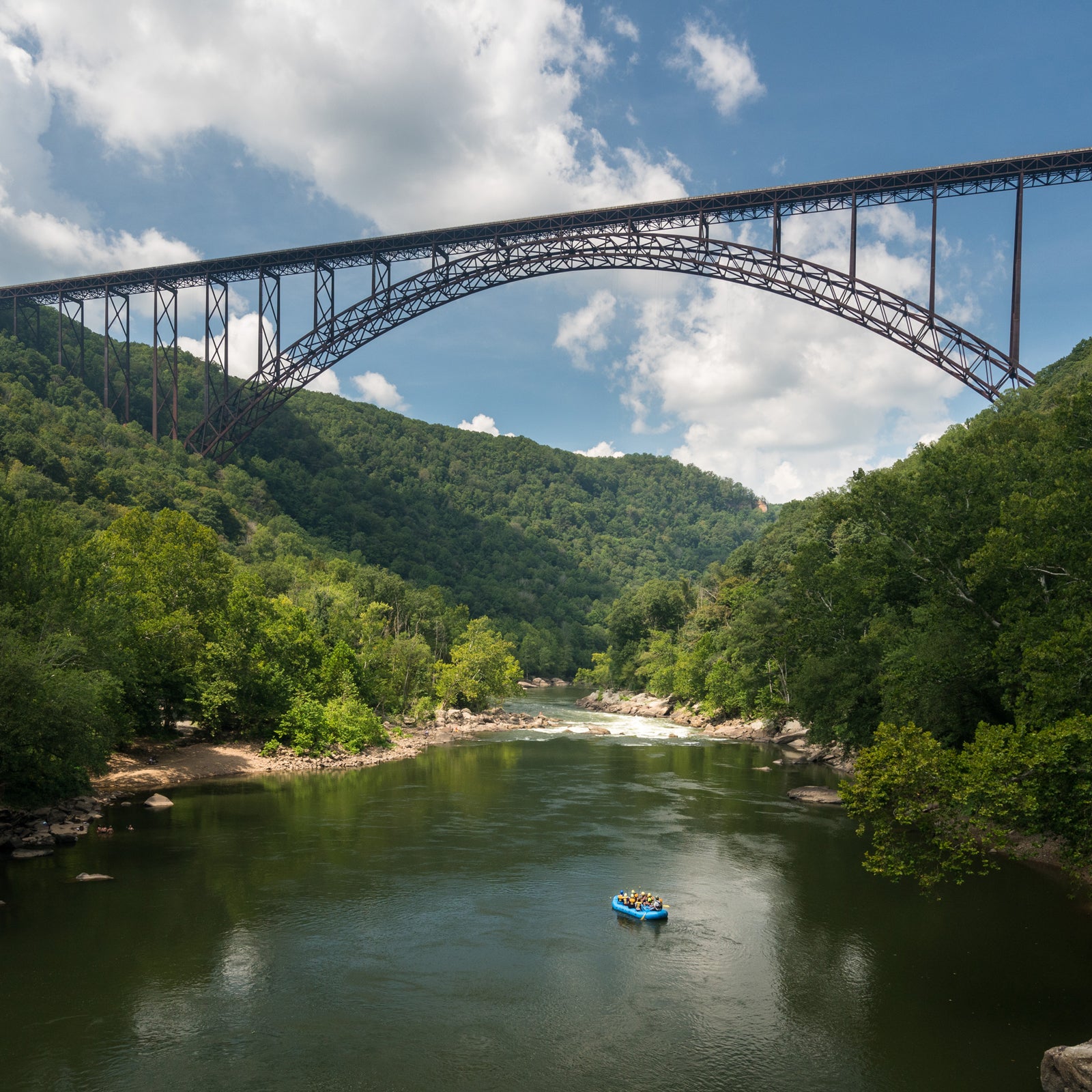The will be upgraded to national-park-and-preserve��status as part of the��e Congress recently sent to the president’s desk. Once signed, within the next few weeks of Trump’s��remaining tenure, the change should go into effect soon after. The New River Gorge National River is one of three units in West Virginia��managed by the National Park Service, alongside the�� and the��. Commonly referred to as the New, the 73,000-acre stretch of rugged canyon in the southeast part of the state has been��a world-class rock-climbing and paddling destination��since its designation as��a national river��in 1978, but advocates for the upgrade in status hope full park status will bring it more cachet.��
“This is going to be such a major investment in tourism in West Virginia,” said senator Shelley Capito during a press conference on December 21. Capito originally proposed a bill for its upgrade��in 2019 with fellow senator Joe Manchin. “Being a national park is a gold stamp of approval and excellence.”
Once ravaged by timber and coal extraction, the gorge has evolved into a premier��adventure destination. The New River Gorge has 53 miles of free-flowing whitewater, highlighted by the “Lower New,” a popular 13-mile stretch packed with Class IV to V rapids. The cliffs of the gorge are a thousand feet high in parts, with walls of Nuttall sandstone that provide climbers with more than 1,500 routes. The site even has a popular system of 12.8 miles of mountain-bike trails built by the Boy Scouts. You could argue that its evolution is a microcosm of what’s happening in West Virginia at large. Coal has traditionally been the driving economic force in the state, but as mining has waned, outdoor recreation has stepped up to fill the gap in recent years, bringing $9 billion to the state annually, according to the . Capito on Monday that the new designation will be a boon for state tourism, with an expected 20 percent bump in visitation based on a study of previous monuments that have been upgraded to national-park status.��
The new designation will create a 7,021-acre park around the heart of the gorge, which is already developed with trailheads and a visitor center, while the remaining 65,165 acres will be designated a national preserve��to allow for backcountry hunting. The bill gives the Park Service��an��opportunity to buy up to 100 acres from neighboring private landowners to increase parking for popular trailheads, as well as��the chance to bid on nearly 4,000 acres of adjacent land to add to the preserve. Still, federal investment should be minimal, considering that the Park Service already manages the land for recreation.��
“It brings me great joy to know that the rivers, forests, lakes, and canyons will forever be protected and preserved,” says Roger Wilson, who started guiding the New River in 1975��and is now CEO of , one of the largest rafting��companies operating inside what will be the new park. “A bunch of river rats in the 1970s saw the outdoor recreational potential of the region, but they also understood that the adventure destination they were building could only be sustainable if it was protected.”
Whitewater rafting is the oldest adventure tourism industry in the area. Decades ago��there were 30 different rafting companies running trips inside in the gorge and nearby Gauley River. The industry has declined in the past decade, however, which locals��have��attributed to . Today��there are only a handful of outfitters operating inside the gorge, and West Virginia sees roughly half of the whitewater-rafting tourists it saw during its heyday in the nineties, when 225,000 people would raft in the state annually. Whitewater tourism��is likely to see the biggest boost from the new park designation, but not everyone is psyched about the upgrade in status. The has been the most vocal opponent. While the national-preservation status of the majority of the gorge is a concession to local hunters, the group is slated to lose roughly 4,000 acres of hunting grounds in the Lower Gorge with the new designation.��
“I want to see all of the local businesses thrive. I want to see the rafting companies do well. But do we really need to cut hunters out of the gorge to make this happen?” asks Logan Bockrath, a kayaker and hunter who has lived in the area for 16 years. “Hunters have had a pretty good relationship with other users for a long time, but we seem to be the sacrificial user group in all of this.”��
The process has left some other locals ambivalent about��the upgrade in status. “We’ve got a great thing going as is. I don’t think we need to change the designation,” says Gene Kistler, president of the ,��nothing that the gorge and its gateway town, Fayetteville, are already��frequented by many visitors each year.��“I think being a national river is badass. What’s wrong with that?”
Aside from the loss of some hunting grounds, the management of the New River as the country’s 63rd national park will largely be the same as it was as a national river. The area has been protected as one of America’s four national rivers since the late seventies, all of which are managed in a similar fashion to national-park units, with an emphasis on recreation. With the new status, it will be one of only five��national-park-and-preserve��combos within the Park Service; the other��four are in Alaska.��
The bill allows for hunting as well as resource extraction in a designated area managed by the Park Service. Climbing and rafting will continue to operate as they have in recent years, and mountain bikers will still have access to the popular . The most noticeable difference the status brings is��the gold standard of land protection. It could help river advocates fight for cleaner water running through the gorge and should ensure access to the world-class climbing inside the new park boundaries for generations to come. And if changing the status does indeed result in a 20 percent visitation bump, then it could mean more people fall in love with the New River’s gems, like Lower Keeney, a Class IV+ big-water wave train, or the beginner-friendly routes of Junkyard Wall. And perhaps having its first full-fledged national park��could help the state of West Virginia completely��embrace the outdoor-recreation-based economy of its future.��


